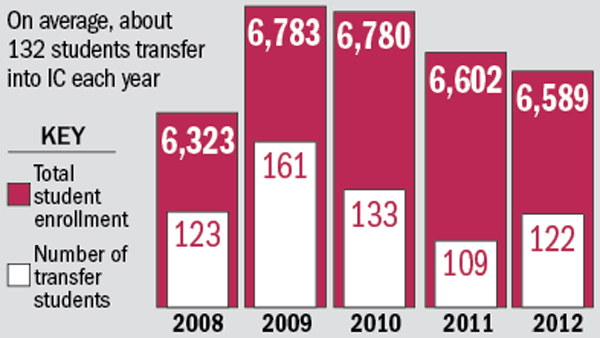As Ithaca College moves forward with IC 20/20, adopts the Integrative Core Curriculum and begins to implement the First Year Residential Experience, the college community is left wondering how transfer students fit into the college’s vision for the future.
The ICC is a facet of the college’s IC 20/20 plan and involves a campus-wide general education system, to create a well-rounded student experience, which went into effect last summer.
But as the costs of higher education continue to rise, many students opt to take classes online or at community colleges before transferring into a four-year institution.
Data obtained from the Office of Institutional Research shows that in the last five years, Fall 2008 to Fall 2012, 659 students have transferred into Ithaca College. On average, about 132 students transfer into the college each year, but the biggest increase in the number of incoming transfer students came in Fall 2009, when 162 students transferred to the college. In Fall 2012, the college welcomed 124 transfer students.
Marisa Kelly, provost and vice president for educational affairs, said the college wants students as well as community colleges to know what courses students would need to take before transferring and how the courses would fit into the new Integrative Core Curriculum.
To fit into IC 20/20, students transferring to the college will take seminars in line with the ICC’s key themes: Mind, Body and Spirit; Identities; Inquiry, Imagination and Innovation; The Quest for a Sustainable Future; A World of Systems; and Power and Justice. Kelly said the college will offer a one-credit transfer student seminar to help students transition into the college’s curriculum more effectively.
“We’ll help them work through how what they’ve done actually aligns with the learning objectives of the core curriculum,” Kelly said.
Kelly said she believes transfer students will be well supported when they come to the college and said the new student advising center, which will launch in the fall, is critical to providing that support and smoothing the transition.
According to the Chronicle of Higher Education, one-third of all college students transfer to another institution at least once before earning a degree. Many factors are involved in a student’s decision to transfer, including personal reasons, financial hardship or social and academic issues.
Eric Maguire, vice president of enrollment and communication, said increased mobility in higher education is a growing phenomenon, and students are searching for affordability as well as quality education.
“Students are increasingly transferring and looking at various options and piecing together their educational experience at the undergraduate level as opposed to just going to one institution and staying there for the four years,” Maguire said.
One of the recommendations by Huron Consulting Group, an outside company hired by the college to assess finances, was to accept a larger number of transfer students into the college. Maguire said the college has to weigh whether it wants to become more transfer friendly or remain primarily an institution based on a four-year residential experience.
“It might be the case that that is not feasible from a financial perspective, that’s a certainly understandable possibility, but at the same time we have to really balance that message in carefully, that we don’t want to devalue what is a really valuable four-year experience from those that can afford it and from those that would benefit from having that opportunity,” Maguire said.
Transferring into some of the professional schools and majors on campus with narrow tracks can be challenging for transfers because of the prerequisites and major-specific classes.
Diane Gayeski, dean of the Roy H. Park School of Communications, said the School of Communications doesn’t have a particular strategy to recruit transfer students. She said students transferring into the Park School, or any professional school, can be faced with challenges in trying to obtain a degree in four years, because the curriculum is so specific and many required courses have prerequisites.
Gayeski said all levels of the four-year experience at the Park School are important to student development.
“The Park School is built on a multi-year experience starting with a lot of activity in cocurricular activities and internships over all four years,” Gayeski said. “And while certainly those are not required, I think students who spend all four years certainly benefit from participating in all those activities at higher and higher levels as they proceed through their degree.”
Sophomore Jessica Bikales, who transferred from a commuter school this semester, said the quality of the communications school and the television-radio major in particular made her decision, and the cost of attendance is worth it.
“I’ve only been here a month, but so far I’ve used professional equipment,” Bikales said “We’ve done a lot in my field production class, so I definitely think that in the long run it will be worth it.”
Though transfer students may miss the full experience, Mary Ellen Zuckerman, dean of the School of Business, said transfer students bring diversity and personal experiences from previous schools attended.
Zuckerman said transfer students come into the business school with different amounts of coursework completed, so they are evaluated and then placed in the correct program.
“They can get integrated into the classes fairly quickly … because they’re often working with other students, they learn what we’re doing here in the business school and can meet other people fairly quickly,” she said.
Bikales said it is an adjustment being farther away from home, but the transfer orientation was helpful.
“It was definitely difficult at first, because I came in mid-year, but they’ve made it pretty easy with the transfer orientation,” Bikales said.








